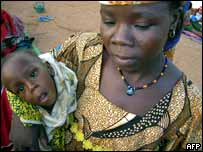
Africa is not getting everything it wants
|
The leaders of the world's eight richest nations have concluded their summit with the promise of a package of measures including a $50bn (£28.8bn) boost to aid, and debt-cancellation for the poorest nations.
They also plan to forge fairer trade deals in the future, to increase access to Aids treatment and to provide a $3bn aid package to the Palestinian Authority.
Below BBC News looks at the reaction to these measures from around the world.
GLOBAL CALL TO ACTION AGAINST POVERTY
"The people have roared but the G8 has whispered," said Kumi Naidoo, chair of the Global Call to Action against Poverty.
"Currently 50,000 people die unnecessarily each day. If the leaders actually implement today's announcement in an urgent manner, we estimate that by 2010 this will fall to around 37,000.
"Those who have joined the world's largest movement to end poverty can be proud that their voice and efforts will ensure that millions more people will live in health and dignity, but they will not rest until all of these needless deaths are stopped.
"The promise to deliver by 2010 is like waiting 5 years before responding to the tsunami.
"Much more needs to be in done in terms of the number of countries, the amount of money and the eradication of conditionalities".
BOB GELDOF
"To save lives is never a whisper.
"People were screaming before, a whisper is not a bad thing.
"Please, perspective!
"Never before have so many people forced a change of policy onto a global agenda.
"If anyone had said eight weeks ago: 'Will we get a doubling of aid? Will we get a deal on debt?' People would have said 'no'.
"I would have said no.
"Today is a great day for those ten million people (who will be saved)."
PAUL WOLFOWITZ, WORLD BANK
"The G8 Summit at Gleneagles was a success because a partnership was forged between African leaders and leaders of the developed world," said Paul Wolfowitz, president of the World Bank.
"This (partnership) includes additional aid and debt relief, as well as trade, improved governance, transparency and accountability.
"On Africa, leaders have asked the Bank to help ensure that the sizeable increase in aid is successfully coordinated and implemented.
"The goal is to provide a framework through which additional resources can be delivered effectively and performance can be measured and evaluated - thus guaranteeing better results. That means assistance for performance and results.
"On climate management, the Bank has been asked to create a new framework for mobilising investment in clean energy and development.
"A first high-level meeting on this is scheduled to be hosted in Britain on 1 November by Prime Minister Blair and the World Bank Group."
OXFAM INTERNATIONAL
"The G8 have recognised today that this is the beginning, not the end, of their efforts to overcome poverty," said Jo Leadbeater, Oxfam's head of policy.
"The world's richest nations have delivered welcome progress for the world's poorest people, but the outcome here in Gleneagles has fallen short of the hopes of the millions around the world campaigning for a momentous breakthrough.
"The G8's aid increase could save the lives of five million children by 2010, but 50 million children's lives will still be lost because the G8 didn't go as far as they should have done.
"If the $50bn increase had kicked in immediately (instead of by 2010), it could have lifted 300 million people out of poverty in the next five years.
"There is an enormous amount to do before the next WTO (World Trade Organization) Ministerial in Hong Kong at the end of the year if people in poor countries are to be given a fair chance to work their way out of poverty."
CHRISTIAN AID
"Africa is not a scar, it is a gaping wound," said Charles Abruge, Christian Aid's head of policy.
"Trade is the single most important component in removing Africa from poverty.
"We were promised a new deal on trade between rich and poor countries but it's business as usual. The G8 will continue to extract maximum concessions out of poor countries at the WTO.

